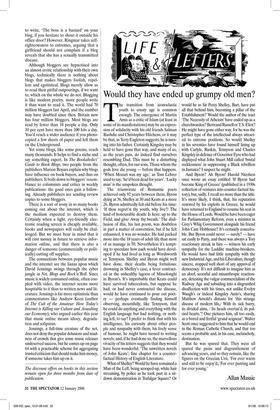Would they have ended up grumpy old men?
The transition from iconoclastic youth to crusty age is common enough. The emergence of Martin Amis as a critic of Islam (at least in some of its manifestations) may be an expression of solidarity with his old friends Salman Rushdie and Christopher Hitchens, or it may be that, as Terry Eagleton suggests, he is turning into his father. Certainly Kingsley may be held to have gone that way, and many of us, as the years pass, do indeed find ourselves resembling Dad. This must be a disturbing thought, often, for our sons. Those whom the gods love die young — before that happens. ‘When Mozart was my age,’ as Tom Lehrer used to say, ‘he’d been dead for years’. ‘Lucky man’ is the unspoken thought.
The triumvirate of Romantic poets achieved only 92 years between them, Byron dying at 36, Shelley at 30 and Keats at a mere 26. Byron admittedly felt old before his time: ‘If thou regret’st thy youth, why live?/ The land of honourable death/ Is here: up to the Field, and give/ Away thy breath.’ The disillusion of this, his last poem, was doubtless in part a matter of convention, but if he felt exhausted, it was no wonder. He had packed more into the 18 years of adult life than most of us manage in 50. Nevertheless it’s tempting to speculate how each would have developed if he had lived as long as Wordsworth or Tennyson. Shelley and Byron might well have done, their deaths being fortuitous: drowning in Shelley’s case, a fever contracted in the unhealthy lagoon of Missolonghi in Byron’s. It’s improbable that Keats could have survived tuberculosis, but suppose he had, or had never contracted the disease, would he have continued to pour out poetry — perhaps eventually finding himself observing, mournfully, like Tennyson, that he could do anything and everything with the English language but had nothing, or nothing left, to say? I prefer to think that with his intelligence, his curiosity about other people and sympathy with them, his lively sense of humour, he might have turned to writing novels; and, if he had done so, the marvellous vivacity of his letters suggests that they would have been wonderful. ‘The unwritten novels of John Keats’; fine chapter for a counterfactual History of English Literature.
What of Shelley? Would he have remained a Man of the Left, being scooped-up, white hair streaming, by police as he took part in a sitdown demonstration in Trafalgar Square? Or would he as Sir Percy Shelley, Bart, have put all that behind him, becoming a pillar of the Establishment? Would the author of the tract ‘The Necessity of Atheism’ have ended up as a churchwarden? Bertrand Russell or T. S. Eliot? He might have gone either way, for he was the perfect type of the intellectual always attracted to extreme positions. So would Shelley in his seventies have found himself lining up with Carlyle, Ruskin, Tennyson and Charles Kingsley in defence of Governor Eyre who had displayed what John Stuart Mill called ‘brutal recklessness’ in suppressing a Black rebellion in Jamaica? I suspect he might.
And Byron? Ah Byron! Harold Nicolson once wrote an essay entitled ‘If Byron had become King of Greece’ (published in a 1930s collection of ventures into counter-factual history), but, sadly, I recall no more than the title. It’s more likely, I think, that, his reputation restored by his exploits in Greece, he would have returned to England to resume his seat in the House of Lords. Would he have been eager for Parliamentary Reform, even a minister in Grey’s Whig Government alongside his friend John Cam Hobhouse? It’s certainly conceivable. But Byron could never — surely? — have sat easily to Party, and there was always a Tory reactionary streak in him — witness his early sympathy for the Luddite machine-breakers. He would have had little sympathy with the new Industrial Age, and his Liberalism, though sincere, stopped well short of any approval of democracy. It’s not difficult to imagine him as an aloof, scornful and misanthropic reactionary, detesting the vulgar commercialism of the Railway Age and subsiding into a disgruntled disaffection with his times, not unlike Evelyn Waugh’s or indeed Kingsley Amis’s, sharing Matthew Arnold’s distaste for ‘this strange disease of modern life,/ With its sick hurry, its divided aims, / Its heads overtax’d, its palsied hearts.’? One pictures him, all too easily, as a bored and fretful ‘grand seigneur’. Walter Scott once suggested to him that he would end in the Roman Catholic Church, and that too seems a probable and, in his case, melancholy, destination.
But he was spared that. They were all spared the pains and disgruntlement of advancing years, and so they remain, like the figures on the Grecian Urn, ‘For ever warm and still to be enjoy’d,/ For ever panting and for ever young.’
Allan Massie


























































 Previous page
Previous page